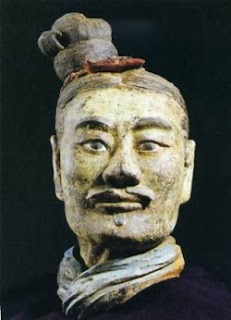
We're living in the early part of the 21st Century. Well . . .most of us are. There are parts of the world where they're still looking forward to 1600, but that's another story. Anyway - for those 21st Century actors reading this, please take a moment to contemplate a life in the 19th Century - say in the time of Dickens. Or in the late 16th Century in the time of Marlowe and Shakespeare.
Those writers, indeed writers of every stripe in any century, wrote for their own audience. They weren't writing for posterity. At least I don't think they were. Imagine the look on Euripedes' mug if he knew that some 2,600 years after he wrote it, a University in Athens (Georgia)was going to produce Electra. Is it important, then, even if the director dresses his cast up like a womens basketball team for the company to know something about the playwrite and the time in which he lived?
The answer is yes. Even if the production strays far from the author's original intent. In order to sit on top of a ladder and drip paint onto a canvas, did Jackson Pollock have to know something about formal aspects of painting? Same answer. So in order to move away from the original play, it would behoove us to know where the original play came from.
But even if we're doing King Lear in spacesuits, odds are we'll be speaking Shakespeare's words, more or less as he wrote them. In order to do that convincingly, we have to understand every word, it's original context and how to pronounce it. The farther all that is from our own experience, the more work we have to do. It is, in fact, a translation issue. The actor has to translate archaic language into something that is easy and familiar
Recently, I coached an actress who had to shoot several scenes speaking Mandarin. She's oriental, but Canadian, and didn't speak Mandarin at all. She learned the Mandarin pronunciation and inflection and her father gave us the English translation. As we worked, she learned the beats, emotionally and physically, in English and then, by associating them with the Mandarin words, was finally able to play the scenes in Mandarin.
That's precisely what I'm suggesting you do with language that isn't your own. With Shakespeare, for example, put the text into your own words. Learn the beats by association, make sure everything is clear and well defined - then play the Shakespearean text. There are plenty of other things you have to do in order to play Shakespeare properly, but we'll save that for another day.
No comments:
Post a Comment